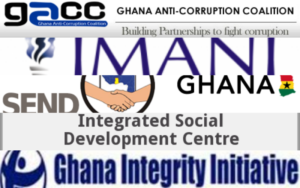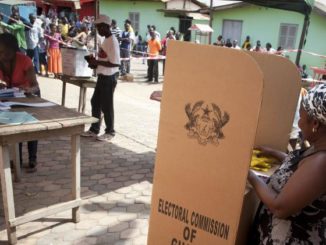18 Civil Society Organisations (CSOs) have rejected the Electoral Commission’s (EC) proposal to compile a new electoral roll ahead of the 2020 presidential and parliamentary elections.

The CSOs are; Ghana Anti-Corruption Coalition (GACC), IMANI Africa, SEND Ghana, Africa Centre for International Law and Accountability (ACILA), Financial Accountability and Transparency – Africa (FAT-Africa), Media Foundation for West Africa (MFWA), Youth Bridge Foundation, West Africa Civil Society Institute (WACSI), Citizens Movement against Corruption (CMaC) and Human Rights Advocacy Centre (HRAC).
The rest are: Ghana Integrity Initiative (GII), Commonwealth Human Rights Initiative (CHRI), Women in Law and Development in Africa (WiLDAF), Institute for Democratic Governance (IDEG), Parliamentary Network Africa (PNA) and ISODEC.
A press release signed by all the CSOs, noted that it will rather be prudent to; “open up the electoral register for voters to verify their names, update the existing software in ways to make it more efficient, remove names of persons suspected dead or who do not verify, work with the vendors to prime the hardware and where needed replace faulty ones and acquire new hardware to augment the existing stock and work with the existing systems rather than a full end-to-end replacement”.
“We reject the EC’s informal, off the grapevine, costing of the alternatives to a full end-to-end replacement. We stand ready to debate the EC in any forum it prefers about its costing”, they added.
The group of CSOs further indicated that if there is a need for collecting fresh data on citizens, the more appropriate, most lawful and financially responsible and justified approach will be to let the National Identification Authority to handle that task.
The full details of the press release are found below:
RECOMMENDATIONS FROM 18 CIVIL SOCIETY ORGANIZATION ON WHAT GHANA SHOULD DO ABOUT THIS NEW REGISTER DISAGREEMENT.
The EC should:
1. Open up the electoral register for voters to verify their names.
2. Update the existing software in ways to make it more efficient.
3. Remove names of persons suspected dead or who do not verify.
4. Work with the vendors to prime the hardware and where needed replace faulty ones.
5. Acquire new hardware to augment the existing stock and work with the existing systems.
This is the more justified approach given time and resource considerations and indeed is the most technically feasible and defensible approach compared to totally replacing the entire system at great cost and running the nation through the trauma of another voter registration exercise.
We reject the EC’s informal, off the grapevine, costing of the alternatives to a full end-to-end replacement. We stand ready to debate the EC in any forum it prefers about its costing.
We need to bear in mind that the NIA has struggled to complete its exercise in 3 years, so the EC purporting to do this in less than 1 year suggests a very stressful time for everyone with no guarantees of success, but a definite requirement for huge resource expenditure.
As a nation, if there is a need for collecting fresh data on citizens, the more appropriate, most lawful and financially responsible and justified approach will be to:
1. let the NIA (The legally mandated Authority for collecting national identification data) collect and process the information.
2. The NIA should then send the EC the subset of the information it needs for the purpose of election.
3. The EC can then use that information to update its systems.
This way the nation moves forward and avoids the wasteful duplication of efforts at great expense.”
Background
Parliament has approved about GHS390 million for the EC to procure a new biometric system which has facial recognition technology and also compile a new voters’ register ahead of the 2020 general elections.
Whereas some political parties backed the decision by the EC, others including the National Democratic Congress have resisted that the move claiming the decision is ill-timed and a waste of taxpayers’ money.
Officials of the EC had insisted that the decision to compile a new register was agreed by the various political parties as did not object to the proposal when it was tabled at Inter-Party Advisory Committee (IPAC) meeting on March 27, 2019.
Over the weekend, the political parties opposing the new register took to the streets of Tamale in the Northern Region to express their disappointment
Meanwhile, thirteen political parties, are in support of the EC’s decision to compile a new electoral roll.
The parties, which are known as the Coalition of Political Parties for ‘YES’ to a new register, believe the EC has made convincing arguments.
EC’s Advisory committee to meet IPAC over new voters’ register brouhaha
Meanwhile, the Electoral Commission’s (EC) Eminent Advisory Committee has called for calm following the heated arguments characterising the election management body’s plan to compile a new voters’ register ahead of the 2020 election.
The Committee has served notice to meet the Inter-Party Advisory Committee (IPAC) to iron out concerns raised over the new register.
The Eminent Advisory Committee is chaired by a former Commissioner of the Commission on Human Rights and Administrative Justice (CHRAJ), Justice Emile Short.
–
Citinewsroom



